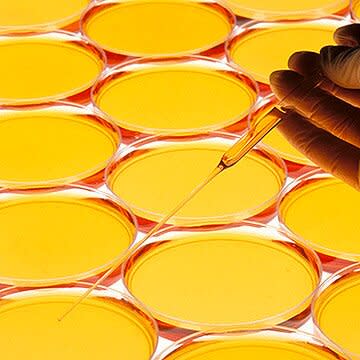The Latest on Genetic Testing

INGRAM
There are a few different categories of genetic testing that parents should know about, says Ellen Simpson, Ph.D., a genetics counselor in the prenatal diagnostic center at the University of California, San Francisco Medical Center. "All these tests are optional, even the screening tests," she says. "Some people don't want testing and are comfortable with ambiguity. Some people feel just knowing that a genetic condition is possible is enough preparation, others want to connect with a support group or meet the doctors who will care for the baby after birth. And, depending on what the condition is, you could save the baby's life by delivering at a special hospital rather than a regular community hospital."
Here's everything you need to know about genetic testing.
What is Prenatal Testing—and Who Benefits From It Most?
A blood test—of one or both parents—can help determine if your children will be at risk of inherited genetic disorders. The American Congress of Obstetricians and Gynecologists gives these guidelines for the types of people that may want to seek out genetic counseling and carrier screening before getting pregnant:
People with a family history of mental retardation or Fragile X syndrome
A woman who had early ovarian failure (before age 40)
One partner has a family history of cystic fibrosis
Both partners are Caucasian or European, since CF is more common in these ethnicities
People of Eastern European Jewish (Ashkenazi) descent, whose children may have an elevated risk of Canavan disease, cystic fibrosis, familial dysautonomia and Tay-Sachs disease
What Are the Most Common First and Second Trimester Screenings?
Blood tests and ultrasounds
With a blood test and ultrasound in your first trimester between 11 and 13 weeks, doctors can determine if your fetus is at an increased risk of having a chromosomal disorder like Down syndrome. If the risk is elevated, your ob may offer you a brand new blood test called cell-free DNA, which looks for fetal DNA in your blood and can tell you with even more increased accuracy whether your fetus is likely to have a chromosomal issue without having to do anything invasive like an amniocentesis test and at no increased risk to the baby. Cell-free DNA hasn't been vetted completely for use in low-risk women yet, says Simpson, and some insurance companies may not cover it. A second trimester blood test between 15 and 20 weeks can screen again for risk of neural tube defects, and again for Down syndrome. An important thing to note is that these screenings can't diagnose a condition -- just tell you if the chances are higher than average. If they are, you can choose to have one of the following diagnostic tests that will tell you for sure, says Simpson.
Amniocentesis or chorionic villus sampling
In an amnio, a doctor removes a small amount of amniotic fluid (which contains some of the baby's skin cells) by inserting a needle through your abdomen into your uterus. Amnios can diagnose many genetic conditions including Down syndrome and spina bifida, sickle cell anemia, cystic fibrosis, and Tay-Sachs. Unfortunately, they aren't 100 percent risk-free -- there is about a very small 1 in 200 risk of miscarriage. Chorionic villus sampling (CVS) is done by inserting a needle through the cervix or abdomen to take a sample of the placental tissue. CVS can diagnose Tay-Sachs, sickle cell, CF and other genetic conditions, but not spina bifida or certain other syndromes. Risk of miscarriage after CVS is about 1 in 100.
Newborn screening
All newborns have a small amount of blood taken just after birth (usually with a tiny prick of the heel) which is then tested for at least genetic disorders like phenylketonuria that can lead to heart problems, hearing loss, or early death.
